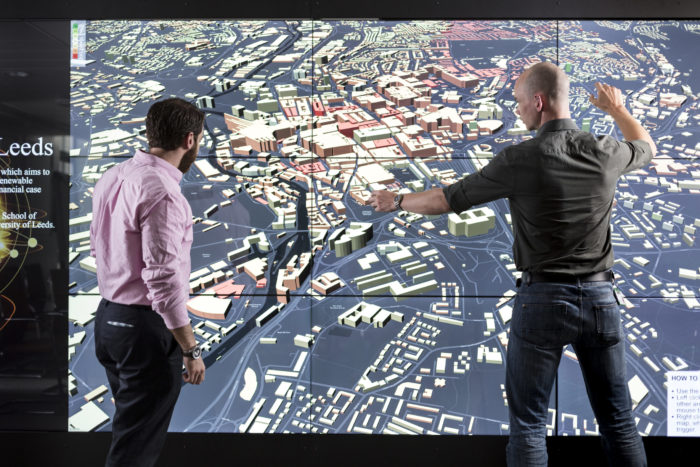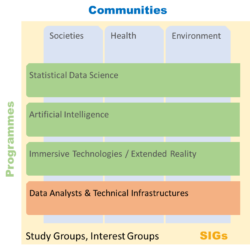LIDA Annual Showcase 2020-21
Research and Innovation

I am pleased to introduce our world-leading, award-winning, and innovative work in complex modelling, statistical data science, machine learning and AI in our second online LIDA Annual Showcase. As leaders, not followers, in data analytics and AI, we continue seeking to drive change through data across multiple disciplines, working with academics, industry, and organisations around the world to benefit populations on a global scale.
International symposiums conducted online over the past year meant collaborations could continue despite the impacts of Covid-19, meaning our important work encompassing health, societies, and environment has continued despite challenging circumstances.
Read more from Professor Alex Frangi, LIDA Director for Research and Innovation.
During the last year LIDA created three data analytics research Communities – Societies, Health and Environment. These build on the University’s strengths and capabilities within these areas and are further supported by LIDA’s strategic ambitions in three research Programmes – Statistical Data Science, Artificial Intelligence and Immersive Technologies (see figure below). Each of the Communities now has a small leadership team of 3-4 academics whose role is to drive the Community. The leadership teams for the Programmes are under development. Finally, over a dozen Special Interest Groups were created that connect academics and end-users with interests in data analytics.

The case studies published below demonstrate in more detail some of the research activity currently being undertaken across these Communities:
Case studies
National Care and Cardiovascular Outcomes
Understanding how COVID-19 lockdowns may have influenced the health-seeking behaviour of heart patients, as well as delivery of care by specialist services, is vitally important. Leeds Institute for Data Analytics researchers have been at the forefront of an academic collaboration to monitor the impact of COVID-19 on emergency cardiac services, morbidity and mortality rates since 2019.
International childhood cancer survival
The Yorkshire Specialist Register of Cancer in Children and Young People (YSRCCYP) maintains accurate collection of sociodemographic and clinical data on children, teenagers and young adults with cancer in Yorkshire. With connections to NHS and other datasets, the YSRCCYP informs the decision-making of local clinicians and commissioners with collaborative national and international epidemiological and outcomes research supported with infrastructure, expertise, and an extensive database encompassing over 15,000 square kilometres of Yorkshire and the Humber, with a population of five million.
Newton Gateway
The COVID-19 pandemic been an unprecedented global public health crisis. To limit direct impact of the virus, all government and public health organisations had to reorganise healthcare services and institute restrictions on travel including lockdowns. And although they reduced the number of people who died and were hospitalised with Covid, what has become more apparent over the course of the pandemic is that the interruption of care for non-Covid 19 conditions will also lead to significant morbidity and mortality.
Consumer Data Research Centre (CDRC): Local Data Spaces
The Local Data Spaces project is a multidisciplinary collaboration between the Consumer Data Research Centre (CDRC), Joint Biosecurity Centre (JBC), the Office for National Statistics (ONS), and ADR UK. It was set up to support local authorities, groups, and stakeholders response to the pandemic using granular, secured data and research-driven analyses. The research has been recognised as innovative, winning the prestigious ONS Research Excellence Project Award 2021 for delivering public good and informed policy decisions.
Synthetic Population Estimation and Scenario Projection Model (SPENSER)
SPENSER (Synthetic Population Estimation and Scenario Projection Model) is a set of open-source tools for population estimation and projection, funded by the Alan Turing institute. It is a partnership between academic and private sector researchers that introduces a novel data-driven modelling framework to run complex simulation models.
Managing crops and food security using machine learning and remote sensing
Researchers from the University of Leeds are tackling these major issues and working together to drive innovation in climate-smart food systems. The work, using complex machine learning is enabling a greater understanding of crop yields and knowing what is grown where using remote sensing data, and is underpinned by a combination of existing work on crop models, AI technology, and deep learning (a subset of machine learning).
Volcano monitoring
Volcanic eruptions are obviously problematic, not only presenting danger to life but also posing significant economic impacts. Some volcanoes have dedicated volcano observatories staffed by experts ranging from seismologists to traditional geologists and people who analyse gas. In some cases, they will be working with satellite remote sensing data. However, about 90% of land volcanoes aren’t really monitored.
Discovering the effect of cloud organisation on Earth's climate
It’s impossible to model every single meter in the atmosphere and so climate models must model the effect of clouds. But studying the clouds by applying self-supervised machine learning directly to the vast amounts of satellite data available provides a unique opportunity to understand cloud formation and therefore improve climate models.
In Silico modelling and digital twins enable trailblazing virtual clinical
A team of researchers is working on computer modelling that provides a viable alternative – a virtual (aka in silico) clinical trial. “Medical devices follow a lengthy evaluation through bench to animal experiments, and then through human trials, with a tiny amount of scientific evidence currently derived from computer modelling and simulation. The cost is ever-increasing, delaying lifesaving benefits to patients, and they are not without fundamental limitations.
Seeing the heart through your eyes, predict heart attacks via retinal image
A multidisciplinary study, led by Dr Nishant Ravikumar, Lecturer in Computer Science, and Prof. Alejandro Frangi who holds the Diamond Jubilee Chair in Computational Medicine, at the University of Leeds, looked at whether an alternative, more cost-effective, and scalable solution could be found to detect indicators of cardiac disease, especially of Myocardial Infarction (MI).
Digital tools to support the government & citizens in transport & mobility
A collaborative, multi-disciplinary and multi-institution project initiated by Dr Robin Lovelace, Asst. Prof. Transport Data Science at the University of Leeds, the Propensity to Cycle Tool (PCT) is revolutionising strategic cycle planning in England and Wales and beyond.
The Propensity to Cycle Tool was developed by team from the Universities of Leeds, Cambridge, Westminster and LSHTM with funding from Department for Transport (DfT) in the UK and the ESRC Consumer Data Research Centre (CDRC).
LIDA Data Scientist Internship Programme
LIDA’s Data Scientist Internship Programme offers early career data scientists the opportunity to hone their expertise working on real-world data and topical research questions, whilst giving academics and LIDA’s partners the chance to harness new talent in finding novel ways to solve data problems. Since its inception in 2016, it has provided 52 paid interns with hands-on experience and ownership of projects drawn from the fields of social science, health and engineering, using data science for public good.
Centres for Doctoral Training
LIDA hosts the Centre for Doctoral Training Data Analytics and Society and the Centre for Doctoral Training for Artificial Intelligence for Medical Diagnosis and Care.
Centre for Doctoral Training: Data Analytics and Society
To read more about the activities and successes over the last year, please click the link below.
Centre for Doctoral Training: AI for Medical Diagnosis and Care
LIDA Affiliated Research Centres
LIDA hosts and supports a number of research centres across a portfolio of research, education and training.
Consumer Data Research Centre
Click here to read their Research Review which looks to demonstrate what can be achieved through the analysis of consumer data in multiple contexts.
Centre for Immersive Technologies
Education and Training
Research and Technology
Partnerships
We believe in innovation through collaboration and work closely with a wide range of data partners in the public, private and third sectors to ensure the Institute’s academic expertise is channelled towards addressing real-world challenges.
LIDA is currently working with a number of key partners. Please click the links below to read more about these collaborations.
The Alan Turing Institute
Leeds City Council
DATA-CAN, the UK’s Health Data Research Hub for Cancer
As the UK’s health data research hub for cancer, our aim is to make high quality health data more accessible for cancer researchers and health professionals, to help improve cancer services and patient outcomes. LIDA was one of DATA-CAN’s founding partners and has been at the forefront of DATA-CAN’s work over the last year.
Sainsburys
Institute of Grocery Distribution (IGD)
For more information about the benefits of working with LIDA click here. If you would like to discuss working with us, please email us at lida@leeds.ac.uk.
To view the LIDA Strategy click here.
www.lida.leeds.ac.uk
